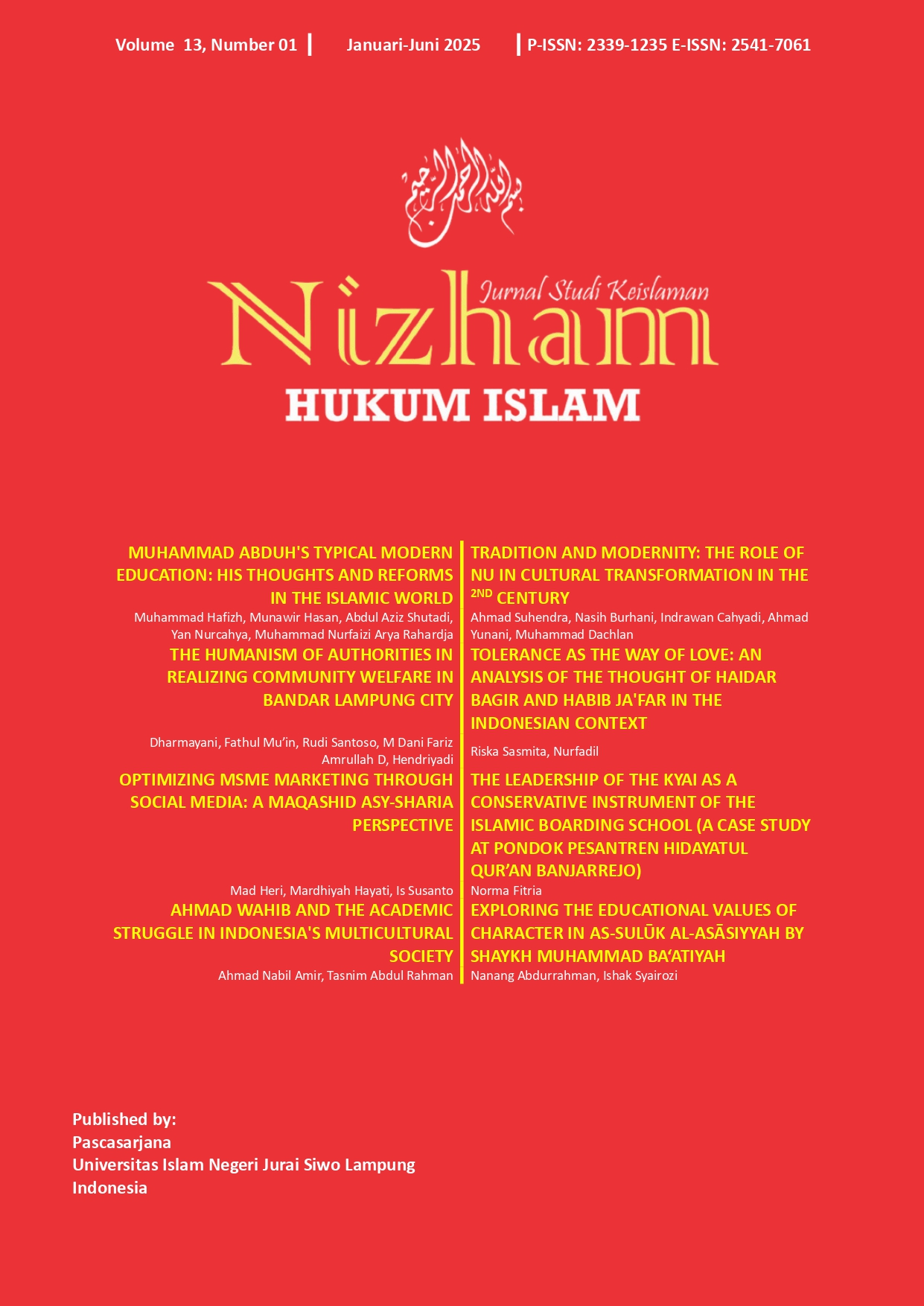The Ideological Dynamics of Pan-Islamism and Its Political Impact on Transnational Movements in the Contemporary Muslim World
DOI:
https://doi.org/10.32332/nizham.v13i02.11567Keywords:
Pan-Islamism, Transnational Movement, Ideological Fluidity, State Repression, RadicalizationAbstract
Abstract
Pan-Islamism is a movement that emerged as a response to European imperial annexation of Muslim territories and the decline of the Ottoman Empire, driven by a desire to restore unity, morals, and political legitimacy of the Muslim territories. Its transnational orientation has evolved and motivated ideologically diverse movements across the world, ranging from the politically reformist Egyptian Muslim Brotherhood to radical groups like Boko Haram in Nigeria and non-political Jama’at Tabligh. Few studies have examined how Islamist ideologies have shape the trajectories, tactics, and recruitment mechanisms of Pan-Islamism in the contemporary era of digital advancement and geopolitical shifts. Utilizing a constructivist political theory and informed by Islamic political morality as a normative framework, this study adopts a comparative discourse analysis to investigate situations from Nigeria, Egypt, and others. Findings of the study reveal that state responses have shaped the prospects of political Islamist struggles, and ideological volatility often exacerbates the trends of radicalization. The study recommends that the government should logically distinguish between peaceful and extreme Islamists through constructive engagement to avert further radicalization of moderate groups.
Downloads
References
Akbarzadeh, Shahram, and Fethi Mansouri. Islam and Political Violence: Muslim Diaspora and Radicalism in the West. Library of International Relations 34. Tauris academic studies, 2007.
Ali, Jan Ashik, and Elisa Orofino. ‘Islamic Revivalist Movements in the Modern World: An Analysis of Al-Ikhwan al-Muslimun, Tabligh Jama’at, and Hizb Ut-Tahrir’. Journal for the Academic Study of Religion 31, no. 1 (2018): 27–54. https://doi.org/10.1558/jasr.35051.
Alizadeh, Hossein. ‘Pan-Islamism. Attempt of Political Islam in the Restoration of Caliphate a Century after Its Abolition in 1924’. Journal of Mediterranean Knolwedge, no. 3 (2) (December 2018): 207, 203–14. https://doi.org/10.26409/2018JMK3.2.06.
Al-Rasheed, Madawi, ed. Salman’s Legacy: The Dilemmas of a New Era in Saudi Arabia. Oxford University Press, 2018.
Al-Rasheed, Madawi, ed. Salman’s Legacy: The Dilemmas of a New Era in Saudi Arabia. Oxford University Press, 2018.
Alwaqiyah TV. The Departure of the Caravan of Hizb Ut Tahrir ‘The Blessed Light That Originated from Masjid al Aqsa’. 4 November 2015. https://www.hizb-ut-tahrir.info/en/index.php/latest-articles/8806.html.
Bukarti, Audu Bulama. ‘Karnukan Shekau Sun Fara Biyoni Da Haushi’. Facebook, 15 April 2025. https://www.facebook.com/share/r/1AXtgxVRGT/.
Formichi, Chiara. Islam and Asia: A History. 1st edn. Cambridge University Press, 2020. https://doi.org/10.1017/9781316226803.
Garba, Dimas. ‘Transnational Insurgency: Boko Haram and Regional Insecurity in Africa’. FUDMA Journal of Politics and International Affairs (FUJOPIA) 1, no. 1 (2018): 82–98.
Gerges, Fawaz A. ISIS: A History. Princeton University Press, 2017. https://doi.org/10.2307/j.ctvc77bfb.
Haddad, Fanar. ‘Sectarian Identity in the Era of the Nation-State’. In Understanding ‘Sectarianism’, by Fanar Haddad. Oxford University Press, 2020. https://doi.org/10.1093/oso/9780197510629.003.0005.
Hegghammer, Thomas. Jihad in Saudi Arabia: Violence and Pan-Islamism since 1979. Cambridge Middle East Studies 33. Cambridge University Press, 2010.
International Crisis Group. ‘Bombing in Abuja: On Nigeria’s Boko Haram’. Austrian Red Cross Austrian Centre for Country of Origin and Asylum Research and Documentation (ACCORD), n.d. Accessed 1 May 2025. https://www.ecoi.net/en/document/1102184.html.
Klausen, Jytte. ‘Tweeting the Jihad : Social Media Networks of Western Foreign Fighters in Syria and Iraq’. Studies in Conflict & Terrorism 38, no. 1 (2015): 1–22. https://doi.org/10.1080/1057610X.2014.974948.
Landau, JACOB M. The Politics of Pan-Islam Ideology and Organization. Oxford University Press., 1990.
Ma’mun, Sukron. ‘Tablighi Jamaat: An Islamic Revivalist Movement and Radicalsm Issues’. ISLAM REALITAS: Journal of Islamic & Social Studies 5, no. 2 (2019): 146–52.
Mandaville, Peter G. Islam and Politics. Second edition. Routledge, 2014.
Mohammed, Yakubu. ‘Nigeria’s Defence Minister Speaks on Use of Drones by Boko Haram’. Premium Times (Nigeria), 8 May 2025. https://www.premiumtimesng.com/news/headlines/793013-nigerias-defence-minister-speaks-on-use-of-drones-by-boko-haram.html.
Nnochiri, Ikechuku. ‘Terrorism: Court Convicts, Sentences 4 Boko Haram Financiers’. Vanguard Newspaper, n.d.
Noorhaidi, Hasan. ‘Between Transnational Interest and Domestic Politics: Understanding Middle Eastern Fatwās on Jihad in the Moluccas’. Brill, Islamic Law and Society, vol. 12, no. 1 (2005): 73–92.
Onuoha, Freedom C, and Samuel Oyewole. ‘Anatomy of Boko Haram: The Rise and Decline of a Violent Group in Nigeria’. Aljazeera Center for Studies, 22 April 2018. https://studies.aljazeera.net/en/reports/2018/04/anatomy-boko-haram-rise-decline-violent-group-nigeria-180422110920231.html.
Rahnema, Ali, ed. Pioneers of Islamic Revival. Studies in Islamic Society. Zed Books, 1994.
Roy, Olivier. Globalized Islam: The Search for a New Ummah. The CERI Series in Comparative Politics and International Studies. Columbia university press, 2004.
Samuel, Thomas Koruth. Radicalisation in Southeast Asia: A Selected Case Study of DAESH in Indonesia, Malaysia and the Philippines. Southeast Asia Regional Centre for Counter-Terrorism (SEARCCT), Ministry of Foreign Affairs, 2016.
Shaw, Madeleine A. ‘As Bad as Each Other’: Egypt’s Counter-Terrorism Policy in the Sinai Peninsula’. Dartmouth College’s Journal of International Affairs, 23 April 2025. https://medium.com/world-outlook/as-bad-as-eachother-egypt-s-counter-terrorism-policy-in-the-sinai-peninsula-f962b5331c15.
Temby, Quinton. ‘JIHADISTS ASSEMBLE: THE RISE OF MILITANT ISLAMISM IN SOUTHEAST ASIA’. Phd Thesis, Australian National University, 2017.
The Embassy of The Kingdom of Saudi Arabia. Joint Statement on the Formation of the Islamic Military Alliance. 2015. https://www.saudiembassy.net/statements/joint-statement-formation-islamic-military-alliance?utm_source=chatgpt.com.
Time of India, dir. USAID Funding ISIS, Al-Qaeda, Boko Haram: Big Storm Strikes Congress Hearing. Youtube, 2025. https://youtu.be/qrW5RqlSXBM?si=3aeKCqsSACOskgaO.
Vohra, Anchal. ‘The Muslim Brotherhood’s Survival Is Now in Question Turkey Has Turned Its Back on the Islamist Group, Eliminating One of Its Last Safe Havens.’ Foreign Policy Magazine, 7 August 2023. https://foreignpolicy.com/2023/08/07/muslim-brotherhood-turkey-survival/?utm_source=chatgpt.com.
Voll, John Obert. Islam. Routledge, 2019.
Yahdi Qolbi, M. Ibnu Ashari. R, Diana, and Imaro Sidqi. ‘Geopolitics and Muslim Countries: Navigating Challenges and Opportunities in Contemporary International Political Dynamics’. MILRev: Metro Islamic Law Review 3, no. 2 (2024): 217–35. https://doi.org/10.32332/milrev.v3i2.9910.
Yavuz, M. Hakan. Nostalgia for the Empire: The Politics of Neo-Ottomanism. 1st edn. Oxford University PressNew York, 2020. https://doi.org/10.1093/oso/9780197512289.001.0001.
Wendt, Alexander. Anarchy is What Makes of it: The Social Construction of Power Politics. The MIT Press vol. 46 No. 2(spring 1992), 391-425
Downloads
Published
Issue
Section
License
Copyright (c) 2025 Saleh Hassan, Dr Fatima Abubakar, Ikilima Abubakar Sherif

This work is licensed under a Creative Commons Attribution-ShareAlike 4.0 International License.









